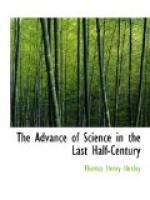THE END.
FOOTNOTES:
[A] There are excellent remarks to the same effect in Zeller’s Philosophie der Griechen, Theil II. Abth. ii p. 407, and in Eucken’s Die Methode der Aristotelischen, Forschung, pp. 136 et seq.
[B] Fresnel, after a brilliant career of discovery in some of the most difficult regions of physico-mathematical science, died at thirty-nine years of age. The following passage of a letter from him to Young (written in November 1824), quoted by Whewell, so aptly illustrates the spirit which animates the scientific inquirer that I may cite it:
’For a long time that sensibility, or that vanity, which people call love of glory is munch blunted in me. I labor much less to catch the suffrages of the public than to obtain an inward approval which has always been the mental reward of my efforts. Without doubt I have often wanted the spur of vanity to excite me to pursue my researches in moments of disgust and discouragement. But all the compliments which I have received from M.M. Arago, De Laplace, or Biot, never gave me so much pleasure as the discovery of a theoretical truth or the confirmation of a calculation by experiment.’
[C] ’Memorable exemple de l’impuissance des recherches collectives appliquees a la decouverte des verites nouvelles!’ says one of the most distinguished of living French savants of the corporate chemical work of the old Academie des Sciences. (See Berthelot, Science et Philosophie, p. 201.)
[D] I am particularly indebted to my friend and colleague Professor Ruecker, F.R.S., for the many acute criticisms and suggestions on my remarks respecting the ultimate problems of physics, with which he has favored me, and by which I have greatly profited.
[E] I am aware that this proposition may be challenged. It may be said, for example, that, on the hypothesis of Boscovich, matter has no extension, being reduced to mathematical points serving as centres of ‘forces.’ But as the ‘forces’ of the various centres are conceived to limit one another’s action in such a manner that an area around each centre has an individuality of its own extension comes back in the form of that area. Again, a very eminent mathematician and physicist—the late Clerk Maxwell—has declared that impenetrability is not essential to our notions of matter, and that two atoms may conceivably occupy the same space. I am loth to dispute any dictum of a philosopher as remarkable for the subtlety of his intellect as for his vast knowledge; but the assertion that one and the same point or area of space can have different (conceivably opposite) attributes appears to me to violate the principle of contradiction, which is the foundation not only of physical science, but of logic in




